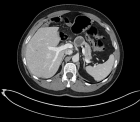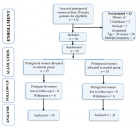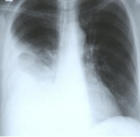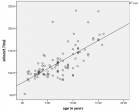Abstract
Research Article
Knowledge, attitude and behaviour of undergraduate medical students towards mentally Ill patients-Suez Canal University, Egypt
Ismail Dahshan, Menna M Saad*, Hassan A Shora*, Hanan Abbas, Mohamed M Awad, Omneya Y Ibrahim and Mohamed Abd El-Wahed
Published: 10 September, 2022 | Volume 6 - Issue 2 | Pages: 034-039
Background: Worldwide, studies show negative attitudes among medical students toward psychiatry and mental illness. The knowledge of the attitude and awareness of the undergraduate medical students toward mental health and psychiatric disorders are most important as they are going to be involved in the care of these patients either directly or indirectly during the years of their careers.
Aim: To explore, the knowledge, attitude, and behavior of undergraduate medical students towards mentally ill Patients before their planned psychiatry rotation in the fourth year of undergraduate medical study, faculty of medicine, Suez Canal University, Ismailia, Egypt.
Objectives: To assess mental health-related knowledge, attitudes and intended behavior of undergraduate medical students towards mentally ill patients.
Subjects and methods: A descriptive, cross-sectional study, conducted on 120 fourth-year undergraduate medical students affiliated with the faculty of medicine-Suez Canal University. A comprehensive sample was used to include all of the students in the fourth year of undergraduate medical study, and the study group participants completed a semi-structured questionnaire including four parts to assess their knowledge, attitudes, and behavioral responses towards individuals with mental illnesses. The data of the study was collected in September-October 2019.
Results: Based on the participants’ scores, the cut-off points estimated to dichotomize the responses as poor or good, for mental health-related knowledge, belief towards mental illness and intended behavior were, 17, 55 and 8.5 respectively. This study showed that the study participants had marginally poor mental health-related knowledge with a median score of 17, poor beliefs about mental illness with a median score of 49.5 and poor intended behavior towards the mentally ill with a median score of 7.
Conclusion: In this study, undergraduate medical students showed marginally poor mental health-related knowledge, poor stigmatizing beliefs, and behavior towards mentally ill patients. More controlled studies are needed to eliminate the inherent response biases in survey studies and to measure the outcomes of anti-stigma educational and curricular interventions.
Read Full Article HTML DOI: 10.29328/journal.jnnd.1001066 Cite this Article Read Full Article PDF
Keywords:
Negative belief; Mental health; Medical students
References
- Thornicroft G. Physical health disparities and mental illness: the scandal of premature mortality. Br J Psychiatry. 2011 Dec;199(6):441-2. doi: 10.1192/bjp.bp.111.092718. PMID: 22130744.
- World health organization. Mental health day: mental disorders. 2018. http://www.who.int/news-room/fact-sheets/detail/mental-disorders.
- Disability Rights Commission, equal treatment: Closing the Gap. A Formal Investigation into Physical Health Inequalities experienced by people with learning disabilities and mental health problems. 2006.
- Lauber C, Anthony M, Ajdacic-Gross V, Rössler W. What about psychiatrists' attitude to mentally ill people? Eur Psychiatry. 2004 Nov;19(7):423-7. doi: 10.1016/j.eurpsy.2004.06.019. PMID: 15504649.
- Kassam A, Glozier N, Leese M, Loughran J, Thornicroft G. A controlled trial of mental illness related stigma training for medical students. BMC Med Educ. 2011 Jul 29;11:51. doi: 10.1186/1472-6920-11-51. PMID: 21801355; PMCID: PMC3161004.
- Luty J, Fekadu D, Umoh O, Gallagher J. Validation of a short instrument to measure stigmatized attitudes towards mental illness. Psychiatry Bull. 2006; 30:257-260.
- Pintard PJ, Sciascia S. Medical students’ attitudes about mental illness. Psychiatry Serv. 2012; 63:836.
- Ucok A, Polat A, Sartorius N, Erkoc S, Atakli C. Attitudes of psychiatrists towards schizophrenia. Psychiatry Clinic Neuroscience. 2014; 58:89–91.
- Shahrour TM, Rehmani RS. Testing psychiatric stigma in a general hospital in Saudi Arabia. Saudi Med J. 2009 Oct;30(10):1336-9. PMID: 19838444.
- Evans-Lacko S, Henderson C, Thornicroft G. Public knowledge, attitudes and behaviour regarding people with mental illness in England 2009-2012. Br J Psychiatry Suppl. 2013 Apr;55:s51-7. doi: 10.1192/bjp.bp.112.112979. PMID: 23553695.
- Evans-Lacko S, Little K, Meltzer H, Rose D, Rhydderch D, Henderson C, Thornicroft G. Development and psychometric properties of the Mental Health Knowledge Schedule. Can J Psychiatry. 2010 Jul;55(7):440-8. doi: 10.1177/070674371005500707. PMID: 20704771.
- Hirai M, Clum GA. Development, Reliability, and Validity of the Beliefs Toward mental Illness Scale. Journal pf psychopathology and Behavioral Assessment. 2000; 22: 221-236.
- Evans-Lacko S, Rose D, Little K, Flach C, Rhydderch D, Henderson C, Thornicroft G. Development and psychometric properties of the reported and intended behaviour scale (RIBS): a stigma-related behaviour measure. Epidemiol Psychiatr Sci. 2011 Sep;20(3):263-71. doi: 10.1017/s2045796011000308. PMID: 21922969.
- Chawla JM, Balhara YP, Sagar R, Shivaprakash. Undergraduate medical students' attitude toward psychiatry: a cross-sectional study. Indian J Psychiatry. 2012 Jan;54(1):37-40. doi: 10.4103/0019-5545.94643. PMID: 22556435; PMCID: PMC3339216.
- James BO, Omoaregba JO, Okogbenin EO. Stigmatising attitudes towards persons with mental illness: a survey of medical students and interns from southern Nigeria. Ment Illn. 2012 Apr 30;4(1):e8. doi: 10.4081/mi.2012.e8. PMID: 25478110; PMCID: PMC4253366.
- Poreddi V, Thimmaiah R, Math SB. Attitudes toward people with mental illness among medical students. J Neurosci Rural Pract. 2015 Jul-Sep;6(3):349-54. doi: 10.4103/0976-3147.154564. PMID: 26167018; PMCID: PMC4481789.
- Altindag A. Effects of an anti-stigma program on medical students’ attitudes towards people with schizophrenia. Psychiatry Clinic Neuro-Science. 2006; 60(3):283–288.
- Alaa El-Din MA. Attitude of medical students toward mentally ill patients: impact of a clinical psychiatric round. The Egyptian Journal of Neurology, Psychiatry and Neurosurgery. 2016; 53(1):6–11.
- Hearn J, Marwood M. Evaluating mental health literacy in medical students in the United Kingdom. Journal of Mental Health Training. 2019; 14(5):339-347. doi: 10.1108/JMHTEP-01-2019-0001
- Abi Doumit C, Haddad C, Sacre H, Salameh P, Akel M, Obeid S, Akiki M, Mattar E, Hilal N, Hallit S, Soufia M. Knowledge, attitude and behaviors towards patients with mental illness: Results from a national Lebanese study. PLoS One. 2019 Sep 16;14(9):e0222172. doi: 10.1371/journal.pone.0222172. PMID: 31525219; PMCID: PMC6746362.
- Zalazar V. Reported and intended behavior towards people with mental health problem in Argentina, International Journal of Mental Health. 2018; 47:3215-227.
Figures:

Figure 1

Figure 2

Figure 3
Similar Articles
-
Knowledge, attitude and behaviour of undergraduate medical students towards mentally Ill patients-Suez Canal University, EgyptIsmail Dahshan,Menna M Saad*,Hassan A Shora*,Hanan Abbas,Mohamed M Awad,Omneya Y Ibrahim,Mohamed Abd El-Wahed. Knowledge, attitude and behaviour of undergraduate medical students towards mentally Ill patients-Suez Canal University, Egypt. . 2022 doi: 10.29328/journal.jnnd.1001066; 6: 034-039
-
The Dynamics of Eating Behavior Disorders and the Level of General Psychological Adaptation in Bodybuilding and Fitness AthletesElena Mihaita*, Georgeta Mitrache, Marius Stoica, Rocsana Manea Bucea Tonis. The Dynamics of Eating Behavior Disorders and the Level of General Psychological Adaptation in Bodybuilding and Fitness Athletes. . 2023 doi: 10.29328/journal.jnnd.1001081; 7: 065-089
-
Application of Nonlinear Dynamic Models of the Oculo-Motor System in Diagnostic Studies in NeurosciencesVitaliy D Pavlenko*, Tetiana V Shamanina, Vladyslav V Chori. Application of Nonlinear Dynamic Models of the Oculo-Motor System in Diagnostic Studies in Neurosciences. . 2023 doi: 10.29328/journal.jnnd.1001086; 7: 126-133
-
Sex after Neurosurgery–Limitations, Recommendations, and the Impact on Patient’s Well-beingMor Levi Rivka*, Csaba L Dégi. Sex after Neurosurgery–Limitations, Recommendations, and the Impact on Patient’s Well-being. . 2024 doi: 10.29328/journal.jnnd.1001099; 8: 064-068
Recently Viewed
-
Prediction of neonatal and maternal index based on development and population indicators: a global ecological studySedigheh Abdollahpour,Hamid Heidarian Miri,Talat Khadivzadeh*. Prediction of neonatal and maternal index based on development and population indicators: a global ecological study. Clin J Obstet Gynecol. 2021: doi: 10.29328/journal.cjog.1001096; 4: 101-105
-
A Genetic study in assisted reproduction and the risk of congenital anomaliesKaparelioti Chrysoula,Koniari Eleni*,Efthymiou Vasiliki,Loutradis Dimitrios,Chrousos George,Fryssira Eleni. A Genetic study in assisted reproduction and the risk of congenital anomalies. Clin J Obstet Gynecol. 2021: doi: 10.29328/journal.cjog.1001095; 4: 096-100
-
Leiomyosarcoma in pregnancy: Incidental finding during routine caesarean sectionToon Wen Tang*,Phoon Wai Leng Jessie. Leiomyosarcoma in pregnancy: Incidental finding during routine caesarean section. Clin J Obstet Gynecol. 2021: doi: 10.29328/journal.cjog.1001094; 4: 092-095
-
Adult Neurogenesis: A Review of Current Perspectives and Implications for Neuroscience ResearchAlex, Gideon S*,Olanrewaju Oluwaseun Oke,Joy Wilberforce Ekokojde,Tolulope Judah Gbayisomore,Martina C. Anene-Ogbe,Farounbi Glory,Joshua Ayodele Yusuf. Adult Neurogenesis: A Review of Current Perspectives and Implications for Neuroscience Research. J Neurosci Neurol Disord. 2024: doi: 10.29328/journal.jnnd.1001102; 8: 106-114
-
Late discover of a traumatic cardiac injury: Case reportBenlafqih C,Bouhdadi H*,Bakkali A,Rhissassi J,Sayah R,Laaroussi M. Late discover of a traumatic cardiac injury: Case report. J Cardiol Cardiovasc Med. 2019: doi: 10.29328/journal.jccm.1001048; 4: 100-102
Most Viewed
-
Evaluation of Biostimulants Based on Recovered Protein Hydrolysates from Animal By-products as Plant Growth EnhancersH Pérez-Aguilar*, M Lacruz-Asaro, F Arán-Ais. Evaluation of Biostimulants Based on Recovered Protein Hydrolysates from Animal By-products as Plant Growth Enhancers. J Plant Sci Phytopathol. 2023 doi: 10.29328/journal.jpsp.1001104; 7: 042-047
-
Sinonasal Myxoma Extending into the Orbit in a 4-Year Old: A Case PresentationJulian A Purrinos*, Ramzi Younis. Sinonasal Myxoma Extending into the Orbit in a 4-Year Old: A Case Presentation. Arch Case Rep. 2024 doi: 10.29328/journal.acr.1001099; 8: 075-077
-
Feasibility study of magnetic sensing for detecting single-neuron action potentialsDenis Tonini,Kai Wu,Renata Saha,Jian-Ping Wang*. Feasibility study of magnetic sensing for detecting single-neuron action potentials. Ann Biomed Sci Eng. 2022 doi: 10.29328/journal.abse.1001018; 6: 019-029
-
Pediatric Dysgerminoma: Unveiling a Rare Ovarian TumorFaten Limaiem*, Khalil Saffar, Ahmed Halouani. Pediatric Dysgerminoma: Unveiling a Rare Ovarian Tumor. Arch Case Rep. 2024 doi: 10.29328/journal.acr.1001087; 8: 010-013
-
Physical activity can change the physiological and psychological circumstances during COVID-19 pandemic: A narrative reviewKhashayar Maroufi*. Physical activity can change the physiological and psychological circumstances during COVID-19 pandemic: A narrative review. J Sports Med Ther. 2021 doi: 10.29328/journal.jsmt.1001051; 6: 001-007

HSPI: We're glad you're here. Please click "create a new Query" if you are a new visitor to our website and need further information from us.
If you are already a member of our network and need to keep track of any developments regarding a question you have already submitted, click "take me to my Query."

















































































































































